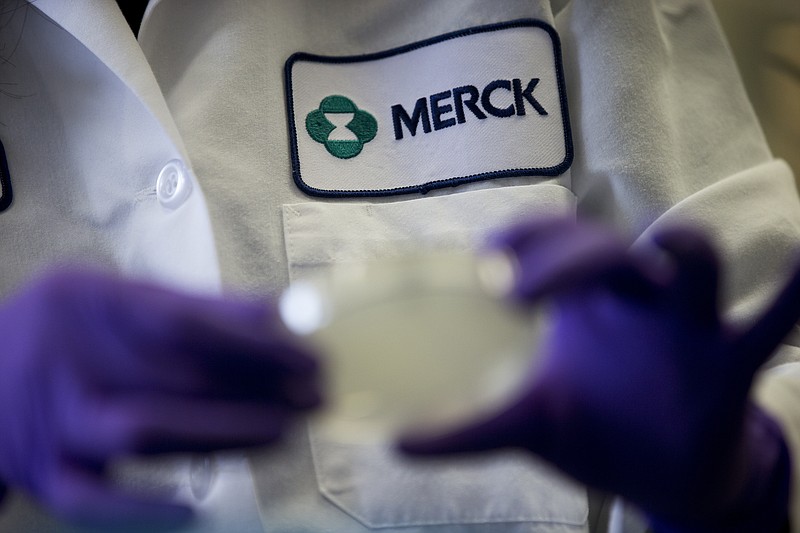Drugmaker Merck sued the federal government on Tuesday over a plan to negotiate Medicare drug prices, calling the program a sham equivalent to extortion.
Merck is seeking to halt the program, which was laid out in the Inflation Reduction Act and is expected to save taxpayers billions of dollars in the coming years.
Passed last year amid public outcry over soaring drug costs, the Inflation Reduction Act gives Medicare -- the largest single buyer of health-care products and services in the U.S. -- the power to negotiate how much it will pay for a certain number of high-priced therapies, for the first time in its history. While the negotiations are estimated to save the government almost $100 billion by 2031, according to the Kaiser Family Foundation, the pharma industry has warned the move will hurt profits and chill research into new drugs.
Merck said in a complaint filed Tuesday that the program does not involve genuine negotiation. Instead, it said, the U.S. Department of Health and Human Services selects drugs to be included and then dictates the price, threatening drugmakers with "a ruinous daily excise tax" if they decline to agree.
"It is tantamount to extortion," the drugmaker said in the complaint, which was filed in the U.S. District Court for the District of Columbia.
The Rahway, N.J.-based drugmaker said that it expects its diabetes treatment Januvia to be part of "the IRA's scheme" starting later this year.
Health and Human Services Secretary Xavier Becerra said in a prepared statement the agency plans to "vigorously defend" the drug price negotiation plan.
"The law is on our side," he said.
The lawsuit names Becerra as a defendant as well as his department and Chiquita Brooks-LaSure, administrator of the Centers for Medicare and Medicaid Services.
Merck argued in a statement that reducing Medicare prices will discourage future investment in the development of new therapies, which has been the industry's argument against price controls for decades.
"By coercing Merck to provide its drug products at government-set prices, the program takes property for public use without just compensation in violation of the Fifth Amendment," the company said in a statement Tuesday.
Several experts who study the industry said the constitutionality arguments were weak and would face an uphill battle in court.
"What Merck argues is 'coercion' is actually the establishment of a freer, more rational marketplace" that will address a crucial root cause of high drug prices, said Dr. Ameet Sarpatwari, an expert in pharmaceutical policy at Harvard Medical School.
Merck said in the complaint that the plan laid out in the Inflation Reduction Act suggests that federal officials will sit down with drugmakers and negotiate voluntary price agreements.
But the drugmaker said the program doesn't involve actual negotiations or agreements. It said Health and Human Services picks the drugs to be included and then leans on the drugmakers to provide steep discounts under the tax threat.
The drugmaker noted that Congress could have simply allowed Health and Human Services to state a maximum price it would pay for a drug or use its leverage to negotiate, but that would have enabled drugmakers to walk away from talks.
Instead, Merck said, the government uses the threat of severe penalties to requisition drugs and refuses to pay fair value, forcing drugmakers "to smile, play along, and pretend it is all part of a 'fair' and voluntary exchange."
"This is political Kabuki theater," the complaint states, noting that allowing drugmakers to walk away from negotiations risks angering Medicare beneficiaries who might not be able to get their medications.
Medicare is the federally funded coverage program mainly for people who are age 65 and older.
Republican lawmakers also have criticized President Joe Biden's administration over the plan, noting that it could compel drugmakers to pull back on introducing new drugs that could be subjected to haggling.
The federal government is expected to soon release rules for negotiating drug prices and then will publish in September a list of 10 drugs that it will start price negotiations on next year.
The plan marks the first time ever that the federal government will bargain directly with drug companies over the price they charge for some of Medicare's costliest drugs. Currently, drug companies tell Medicare how much a prescription costs, leaving the federal government and Medicare beneficiaries to pay up.
Januvia, Merck's widely used drug for diabetes, is likely to be on that list.
The program could also affect Merck's long-term plans for its golden goose, the blockbuster cancer drug Keytruda. It could be among the first products targeted when negotiations begin in 2028 on drugs administered in a health care setting.
The current version of Keytruda, administered as an infusion, will face its first competition that same year, so its sales are expected to erode regardless of whether the program targets it. But Merck had been expecting to bring in significant revenue from a new formulation of Keytruda it is developing that can be more easily given under the skin. That could be subject to negotiation, too, under the government's plans for the program.
"Since 2000, companies like ours have invested more than $1.1 trillion in the search for new treatments and cures, including $102.3 billion in 2021 alone," the drugmaker said in an email. "Merck intends to litigate this matter all the way to the U.S. Supreme Court if necessary."
PhRMA, which lobbies on behalf of drug companies, said it may take similar action. "We will consider every tool available to protect patients and future innovation, which includes potential litigation," the industry group said in an email.
Information for this article was contributed by Tom Murphy and Amanda Seitz of The Associated Press, Rebecca Robbins of The New York Times, Christopher Rowland of The Washington Post and Nacha Cattan, Zoe Tillman and Bob Van Voris of Bloomberg News.
